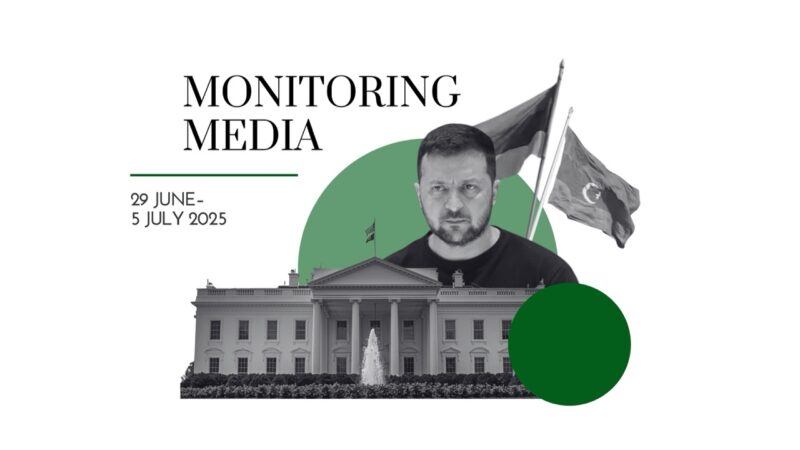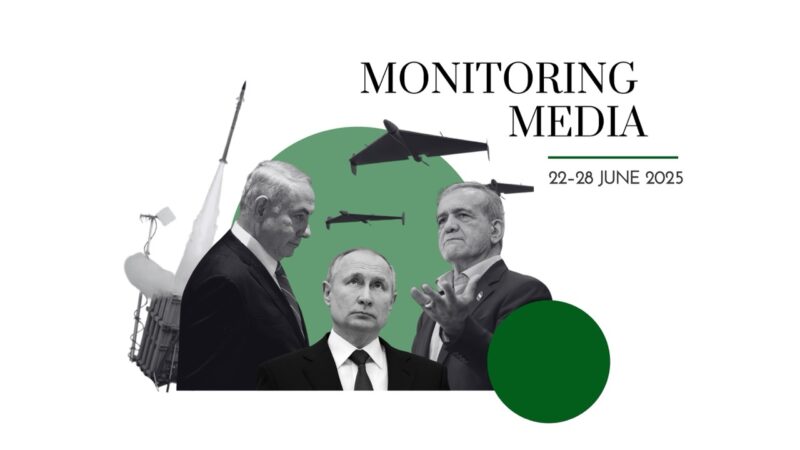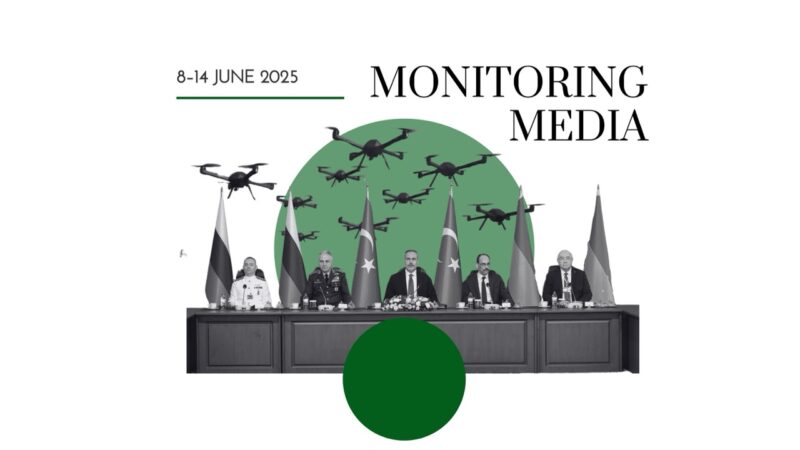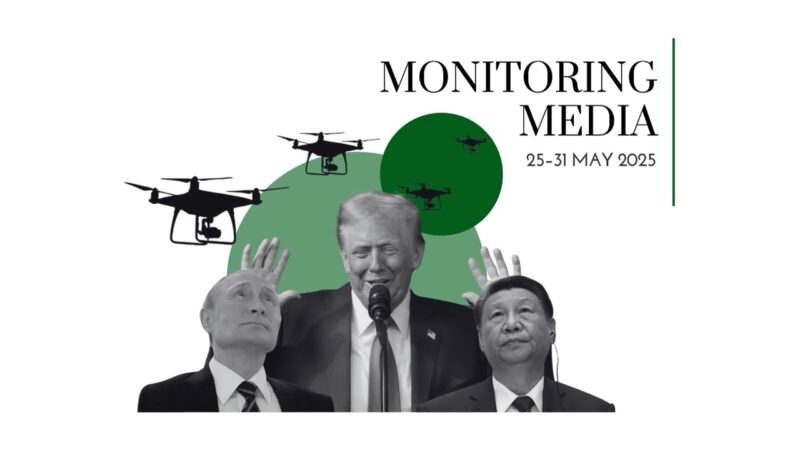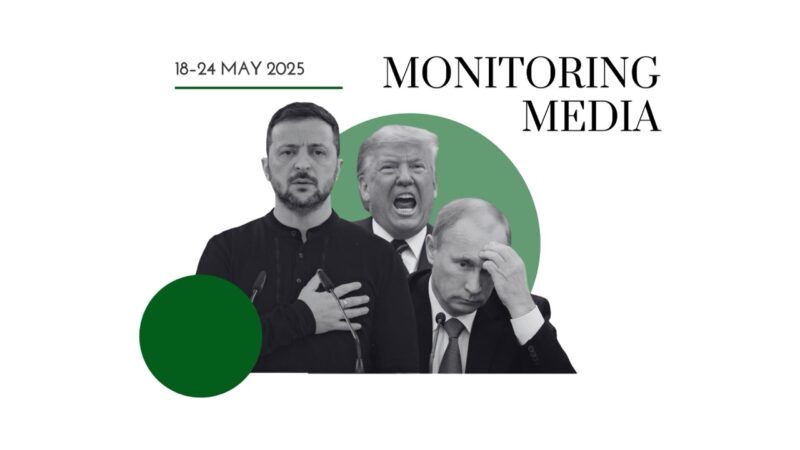Price of peace must be lower than the price of war
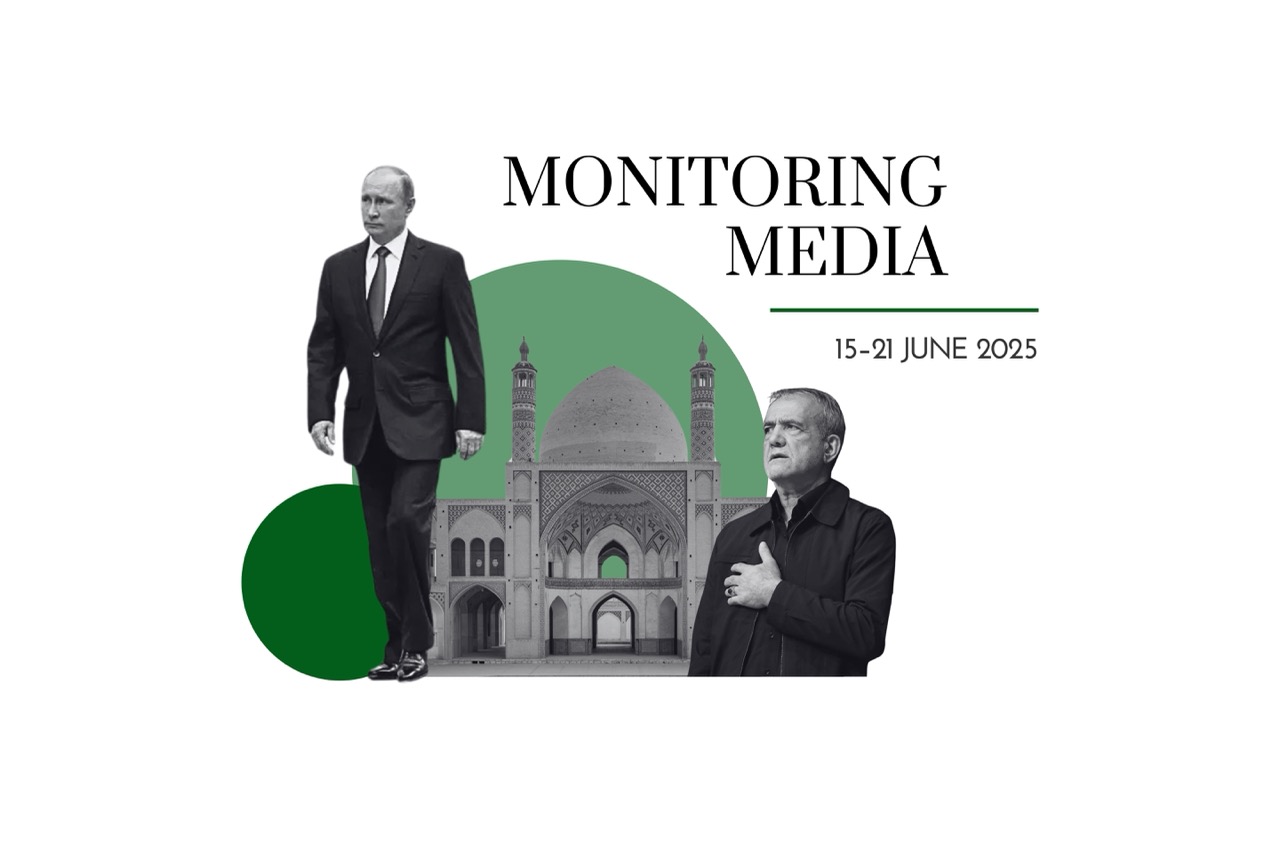
CIUS weekly report on North American media coverage of Ukrainian affairs, 15–21 June 2025
Four publications (The National Interest, Foreign Affairs, The Atlantic, and The Wall Street Journal) were selected to prepare this report on how Ukraine has been portrayed in the North American press during the past week. The sample was compiled based on their impact on public opinion as well as on their professional reputation, popularity among the readership, and topical relevance. These publications represent centrist viewpoints on the political spectrum.
This MMS report covers only the most-read and relevant articles about Ukraine, as ranked by the respective North American publications themselves in the past week. Its scope covers promoted articles on home pages and articles from special sections on Ukraine, with the hashtag #Ukraine, from the paper editions of the publications, and about Ukraine from opinion columns and editorials.
Featured topics
- The world and Ukraine: Changing global order risks broadening the nuclear weapons club; NATO should drop Ukraine’s membership bid for the sake of peace.
- Russia at war: Trump is inconvenient for Putin; price of peace must be lower than the price of war; Russia turns away from Iran.
MMS summaries
Trump is inconvenient for Putin. Andrew Ryvkin (Atlantic) surmises that President Trump is becoming a burden for the Kremlin. Despite the fact that the administration of the newly elected US president has been extremely lenient toward the Kremlin in its proposals and statements, strategically this approach has created significant problems for Moscow: “Trump’s efforts at rapprochement have left Russia’s propaganda apparatus, foreign policy, and economic stability in worse shape than they were before January 20.” Regardless of its initial intentions, Washington has deprived the Kremlin of its eternal enemy: the US. The title of Russia’s civilizational enemy has been transferred to the EU: “The Russian propaganda machine has some flexibility, but being locked in an existential struggle with the Netherlands is far less flattering to the imperial mindset than going up against the world’s leading superpower.” Moreover, this creates inconvenience for President Putin himself, as he is forced to negotiate with President Zelensky, whom he has called illegitimate for years. According to Ryvkin, “During the first three years of Russia’s all-out war in Ukraine, the United States and the EU presented a united front against Russia that proved, perhaps paradoxically, manageable for the Kremlin, in terms of both propaganda and strategic positioning. Trump has shattered that coherence, and now the Kremlin finds itself in an uncomfortable position, despite its triumphalist rhetoric and maximalist demands: It’s scrambling to keep pace with an American president who has no idea where he’s going.”
Price of peace must be lower than the price of war. Lawrence D. Freedman (Foreign Affairs) asserts that Russia will only end its war against Ukraine when it realizes that victory is impossible. At present, no concessions will force the Kremlin to the negotiating table, as President Vladimir Putin believes he can win the war, even at the cost of heavy losses. The White House’s assumption that concessions to Moscow will bring peace closer is mistaken. President Putin has several possible reasons for refusing to agree to a ceasefire. First, there is no issue more important to him than Ukraine: “Ensuring that the country can never be truly independent of Russia is essential to his legacy.” Second, Moscow does not believe that the war cannot be won. Third, “for Putin, ending the war without meeting his core political objectives would be tantamount to a defeat and would leave the patriotic, ultranationalist bloc that he has cultivated and nurtured during the war deeply angered.” Fourth, there is a danger of losing situational alliances: “[Putin] would lose face among his most important partners in China, Iran, and North Korea, as well as in those countries of the ‘global majority’ that he has been seeking to impress and even lead.” According to Freedman, “If the war in Ukraine is going to end through negotiations, therefore, Putin will need to be convinced not only that his political objectives are unrealistic but also that a failure to reach a deal will result in Russia’s position worsening over time.”
Russia turns away from Iran. Brandon J. Weichert (National Interest) claims that Moscow is provoking a war between the US and Iran, hoping that this will lead to Russia’s victory in its war against Ukraine. The USA’s entry into the war in the Middle East was the best gift for the Kremlin—except perhaps for a “Chinese invasion of Taiwan.” This turn of events will allow Moscow to achieve two key objectives: “The United States to stop arming the Ukrainians, and the global price of oil and natural gas to increase, throwing a lifeline to Russia’s stagnant economy.” According to the author, the Kremlin is confident that the US will not be able to support its allies in two military conflicts at the same time. Instead, Moscow will betray Tehran without hesitation: “Russia needs drones and military gear from Iran. But Russia has gotten most of what it needed from Tehran. Today, the largest foreign supplier for Russia’s war machine is North Korea, not Iran.” According to Weichert, “So losing the friendship of the Islamic Republic—and potentially abandoning it to an American-backed regime change—is harmful but not catastrophic. In fact, it all redounds to Russia’s strategic benefit. The war in the Middle East ensures the loss of the Ukraine War.”
Changing global order risks broadening the nuclear weapons club. Yaroslav Trofimov (Wall Street Journal) explores how the war in Ukraine, combined with North Korea’s growing arsenal and Iran’s ambitions, is fueling a global shift in nuclear policy thinking. The central concern is whether nuclear weapons are now seen as essential for survival by both authoritarian regimes and democratic allies. Ukraine’s disarmament in the 1990s, once hailed as a diplomatic success, is now widely regarded as a cautionary tale. “Many regard Ukraine’s disarmament as a strategic blunder, leaving it vulnerable to a Russian invasion,” Trofimov notes, highlighting the failure of the 1994 Budapest Memorandum to guarantee Ukrainian sovereignty. In stark contrast, North Korea, which “emerged from isolation to join a formal military alliance with Russia,” continues to act with impunity, shielded by its nuclear deterrent. Meanwhile, erosion of global trust in US security guarantees—especially under President Donald Trump—has led even American allies like South Korea, Japan, Poland, and Turkey to contemplate nuclear options. “Trump is certainly not going to take nuclear risks for allies, that’s just painfully obvious,” says Robert Kelly, a professor in South Korea. Opinion polls now show broad domestic support in South Korea for acquiring nuclear weapons, while France’s Cold War–era decision to build its own deterrent is seen as prescient. Meanwhile, nonproliferation frameworks like the NPT (1968 Nuclear Non-Proliferation Treaty) are weakening. As Ukraine’s former foreign minister Pavlo Klimkin warns, “The NPT is not sustainable when a lot of countries feel that they are not secure delivering on NPT.” The author argues that the world may be shifting toward a new era in which nuclear deterrence is no longer seen as taboo but increasingly viewed as a necessary safeguard in a fragmented and volatile global order.
MMS takes a closer look:
NATO should drop Ukraine’s membership bid for the sake of peace. Charles Kupchan (Foreign Affairs) argues that the Trump administration has—despite its broader diplomatic missteps—taken a strategically sound position in signalling that NATO membership for Ukraine is no longer a viable option. According to the author, the long-standing promise of Ukraine’s eventual NATO accession has been a dangerous illusion, one that “encourages Kyiv to futilely push for membership, weakening the Ukrainian leadership when it inevitably falls short,” Kupchan adds. A shift in US policy that prioritizes ending the war through a ceasefire and removing NATO from the negotiating equation could “make it easier to negotiate a cease-fire with Russia, whose legitimate objections to Ukraine’s entry into NATO partially motivated its invasion.” Kupchan cites Moscow’s longstanding opposition to NATO enlargement (often referred to in Russia as NATO “expansion”) and argues that the alliance’s eastward movement has consistently been viewed in Russia as a strategic threat.
(MMS notes that before Russia’s 2014 illegal invasion of Ukraine, NATO had no permanent multinational troop presence on its eastern flank. Following the annexation of Crimea and the destabilization of eastern Ukraine, NATO suspended its cooperation with Russia and, in 2016, deployed battlegroups to the Baltic States and Poland.) Putin, for instance, is quoted describing NATO’s enlargement as “a serious provocation,” reinforcing the view that its presence in Ukraine would pose a threat to Russia “by dint of its sheer proximity.” While placing these concerns in a broader geopolitical and historical context—including comparisons to how the United States has guarded its own sphere of influence—the author is clear that such concerns do not justify Russia’s invasions. “These arguments by no means justify Russia’s 2014 and 2022 invasions of Ukraine, nor do they legitimize Putin’s imperial ambitions or his delusions about the unbreakable civilizational ties between Russia and Ukraine.” Finally, the author advocates for a pragmatic reassessment of Ukraine’s security architecture, urging NATO to support Ukraine through bilateral pacts, EU integration, and sustained military assistance—short of membership. “Closing the door on Ukraine will allow Kyiv and its supporters to get on with the task of making other plans for providing the country the security it needs and deserves,” Kupchan argues. A Trump-led proposal for a ceasefire—even one that leaves Russia in control of 20% of Ukraine’s territory—is framed as acceptable only if it enables Ukraine to emerge as “a sovereign, secure, and prosperous democracy.” NATO, in turn, will need to provide Ukraine “the military capability, training, and intelligence needed to block further Russian advances, enabling Kyiv to make it clear to Putin that he has already conquered as much of Ukraine as he is going to get.”
(MMS reminds readers that appeasement of Nazi Germany was unsuccessful at the start of the Second World War and is highly unlikely to be successful with Putin’s Russia today.)
